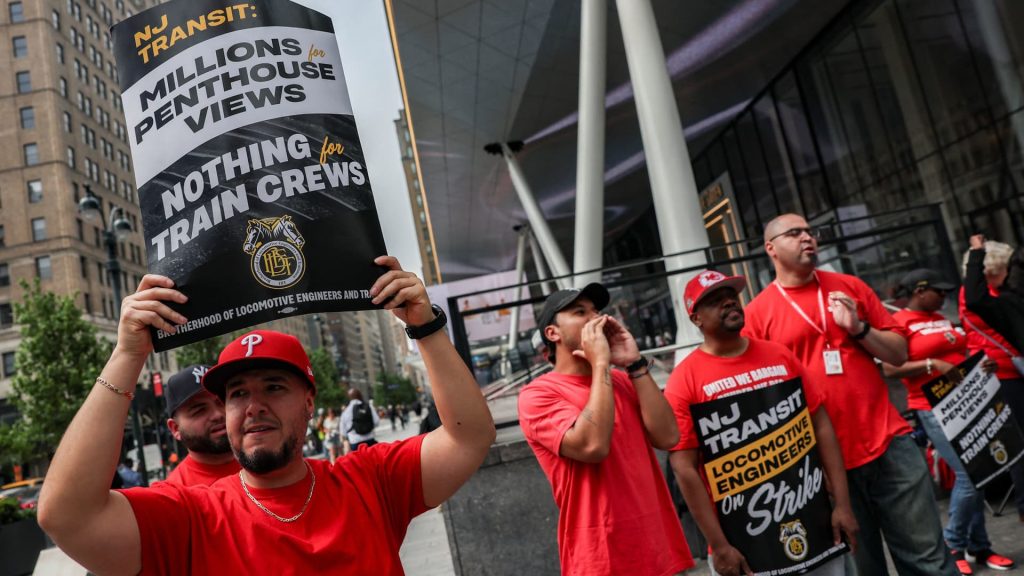The recent strike by the Brotherhood of Locomotive Engineers and Trainmen against New Jersey Transit (NJ Transit) concluded with a tentative agreement announced on Sunday. After nearly 40 years without a strike, this major labor dispute disrupted services for approximately 100,000 daily passengers until a resolution was reached. NJ Transit President and CEO Kris Kolluri confirmed that regular train schedules will resume on Tuesday, urging commuters to prioritize safety while operations are restored.
| Article Subheadings |
|---|
| 1) Background of the Strike |
| 2) Resolution of the Dispute |
| 3) Responses from Officials |
| 4) Implications for NJ Transit |
| 5) Future Outlook |
Background of the Strike
The strike commenced at 12:01 a.m. on Friday, fueled by disputes over pay affecting approximately 450 locomotive engineers employed by NJ Transit. This labor action brought the nation’s third-largest transit system to a grinding halt, interrupting service for around 350,000 riders. This interruption was significant, considering NJ Transit trains typically accommodate around 100,000 passengers each day alone.
The union representing the workers emphasized that their members have not received any salary increases in over five years, causing growing frustration, particularly as it was made clear that NJ Transit engineers received some of the lowest compensation compared to similar roles across major railroads in the United States. Union officials pointed out that engineers at Amtrak and the Long Island Railroad earn rates approximately $10 per hour more than their NJ Transit counterparts. This dissatisfaction ultimately led to the decision to down tools.
Resolution of the Dispute
Negotiations continued throughout the weekend, culminating in the announcement of a tentative agreement that aims to address the pay issues raised by the union. NJ Transit President Kris Kolluri underscored the complexities surrounding the operation, emphasizing the importance of ensuring safety prior to resuming service. He stated,
“This is an extraordinarily complex operation. We will never compromise the safety of our riders.”
Once the agreement is ratified, it is expected to provide improved pay rates that surpass an earlier proposition put forth by NJ Transit which had been rejected by the union. Union leaders conveyed optimism regarding the new terms, suggesting that they represent a significant step forward.
Responses from Officials
New Jersey Governor Phil Murphy welcomed the agreement, expressing confidence that it balanced the needs of NJ Transit employees with the financial realities of the state’s commuters and taxpayers. He commended the efforts of officials involved in the negotiations, stating during a news conference,
“They have poured hour after countless hour into reaching an agreement that is both fair to NJ Transit’s employees and affordable for our state’s commuters.”
General Chairman of the locomotive union at NJ Transit, Tom Haas, expressed his satisfaction with the outcome. Additionally, national union representatives highlighted the support received from passengers and labor communities, acknowledging the solidarity exhibited during the strike.
Implications for NJ Transit
The halt of the NJ Transit train services not only affected daily commuters but also raised broader concerns regarding the operating efficiency and financial stability of the transit system. As highlighted by Kris Kolluri, NJ Transit will need to conduct a series of safety inspections and ensure that essential equipment is ready before service resumes fully. This preparation is vital to ensure safety and reliability moving forward.
Government officials indicated that the resolution aims to prevent future labor disputes by establishing a benchmark agreement that accounts for the financial constraints of NJ Transit while also being acceptable to workers. The success of this negotiation process could serve as a template for managing potential conflicts that may arise within other unions operating under NJ Transit.
Future Outlook
With a tentative agreement in place, the focus shifts to how quickly NJ Transit can restore full service post-strike. President Kris Kolluri urged commuters to work from home on the upcoming Monday, highlighting the operational challenges involved in resuming train service. This careful approach to reestablishing operations illustrates NJ Transit’s commitment to passenger safety.
As the union prepares for a ratification vote, the outcome will determine the long-term effectiveness of the agreement negotiated this weekend. Continued observation of this situation will be essential, as both parties work to ensure that the terms met not only the immediate pay concerns but also improved the overall working conditions for transit workers moving forward.
| No. | Key Points |
|---|---|
| 1 | The NJ Transit rail strike ended after a tentative agreement was reached. |
| 2 | The strike, lasting from Friday morning, disrupted service for about 350,000 riders. |
| 3 | Officials worked diligently to negotiate a fair agreement that balances employee pay and commuter affordability. |
| 4 | Safety inspections and equipment checks are required before trains can resume normal operations. |
| 5 | The labor agreement is expected to set a precedent for future negotiations within NJ Transit. |
Summary
The resolution of the NJ Transit strike showcases the delicate balance between worker compensation and the operational capabilities of a vital transit system. As services are scheduled to resume, it remains to be seen how the ratification of the new contract will influence ongoing labor relations within NJ Transit. This episode not only highlights current labor issues but also exemplifies the importance of thorough negotiations in cultivating a harmonious working environment for transit employees and ensuring safe and reliable service for commuters.
Frequently Asked Questions
Question: What led to the NJ Transit strike?
The strike was initiated due to disputes over wages, with locomotive engineers seeking pay increases to reflect industry standards, as they had not received raises in over five years.
Question: When will NJ Transit trains resume their normal operations?
Trains are set to resume regular schedules on Tuesday following the resolution of the strike.
Question: How did the public respond to the strike?
The union received considerable support from NJ Transit passengers and the labor community, illustrating public concern for both transit workers’ rights and the impact on commuters.
